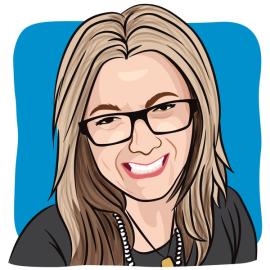- About Us
- Advertise / Support
- Editorial Board
- Contact Us
- CancerNetwork.com
- TargetedOnc.com
- OncLive.com
- OncNursingNews.com
- Terms & Conditions
- Privacy
- Do Not Sell My Information
- Washington My Health My Data
© 2025 MJH Life Sciences™ and CURE - Oncology & Cancer News for Patients & Caregivers. All rights reserved.
What I Learned About Previvorship and Representation in Social Media

Georgia Hurst is a fierce patient advocate for those with Lynch syndrome. Her advocacy work has afforded her opportunities to write for medical journals, various websites, books and genetic testing companies, and collaborate as a stakeholder for the National Academy of Sciences: Genomics and Population Health Collaborative. She is the co-creator of #GenCSM (Genetic Cancer Social Media) on Twitter.
I’ve learned that social media can unite people at hereditary cancer risk but often leaves diverse voices out, so real change means every story is seen and valued.
I recently connected online with researchers from the University of Sheffield who focus on previvorship, which is living with a hereditary cancer risk like Lynch syndrome or BRCA. Their session, “Shaping Good Social Media for Carriers of Hereditary Cancer Syndromes,” made it clear that a big challenge is making sure everyone facing hereditary cancer risk is accurately and fully represented on social media. Advocacy should amplify a wide range of voices so everyone at risk feels recognized, and information should cover not just the science but also the emotional and social aspects.
After more than ten years of raising awareness about Lynch syndrome, I’ve seen that social media can bring people together, teach, and offer support, but it can also leave some out. The stories that get the most attention are usually from people who are white, female, educated, and have more resources. This means minority communities, men and those with fewer resources often go unseen. This gap is not just unfair — it makes support and advocacy less effective for people from different backgrounds. To treat hereditary cancer risk fairly, we need to make sure every story is valued and visible, not just the most common ones.
I’ve come across many posts with wrong information about Lynch syndrome, so I always tell people to see a certified genetic counselor before and after genetic testing. For someone who is newly diagnosed or just starting to learn, the number of mixed messages on social media can be overwhelming and often incorrect. Social media can help people learn, but without trustworthy sources, it can also cause fear and confusion.
This lack of broad representation is not just an online issue; it’s a very unfortunate, yet common theme in our country. It leads to worse outcomes and less access for minorities facing hereditary cancer risk. These gaps show bigger problems in the system and highlight the need for change that includes everyone, not just those with more privilege. When entire groups are left out of online spaces, the public’s understanding of hereditary cancer risk stays incomplete. Real progress in this field means advocacy must reflect all lived experiences, not just those with the most advantages.
Many factors contribute to this lack of representation. Cultural beliefs, distrust of doctors and hospitals, shame, and money problems all play a part. Some communities have had bad experiences with medical care, and others see illness as too private or embarrassing to talk about. Families with money struggles often focus on daily needs before thinking about genetic risk. The discussion also showed that LGBTQ+ people, who are also at risk, face special challenges. They may feel alone, unwelcome, or unsafe sharing online. The risks and fears these groups face make them even less visible, so broad representation is not just a goal — it is necessary.
For some people, sharing personal health details online brings support, but others see it as risky. This makes advocacy harder. When people feel left out or unsure about joining in, important perspectives are lost. By creating safe and welcoming spaces, we can help more people take part. Talking with advocates and researchers reminded me that good advocacy for those facing hereditary cancer risk must include many different experiences and recognize how risk connects with each person’s identity.
Awareness of Lynch syndrome and BRCA is getting better, but there is still more to do. The goal is real fairness in awareness, access, and representation. If you are part of this community or want to help, share your story, support advocacy, and encourage more diverse voices to join in online. Together, we can make sure social media and advocacy lead to real change by recognizing every story. Every voice matters.
This piece reflects the author’s personal experience and perspective. For medical advice, please consult your health care provider.
For more news on cancer updates, research and education, don’t forget to subscribe to CURE®’s newsletters here.
Related Content:



